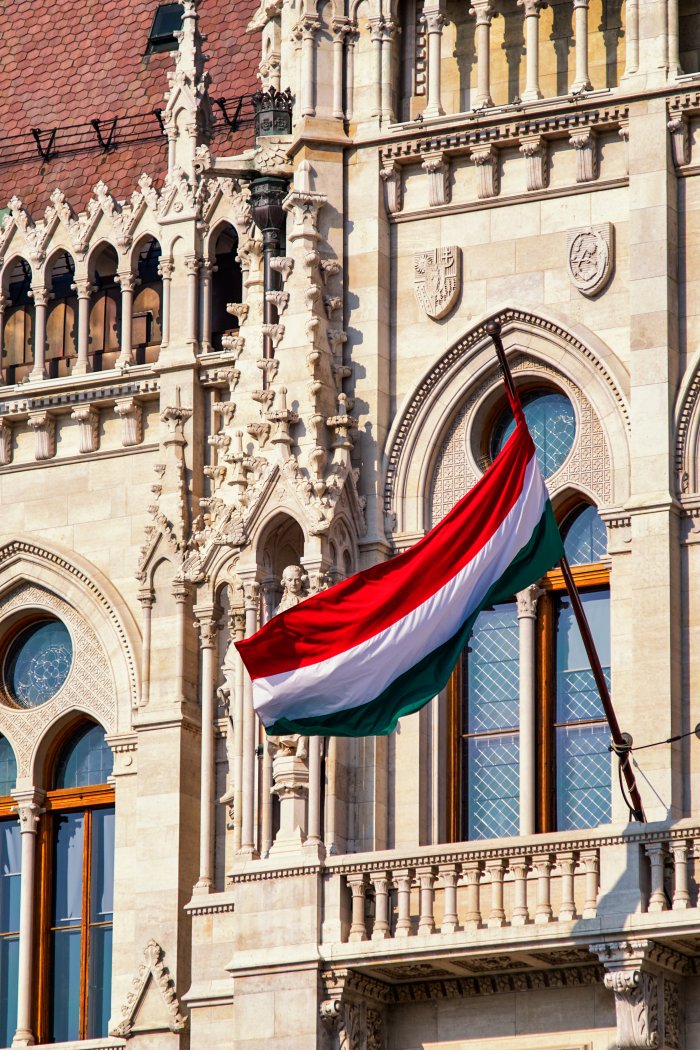30 Years of Freedom - Third Time’s a Charm: The Hungarian Republic Reborn

Mirko Kuzmanovic / Shutterstock.com
In 1989, Hungary completed its peaceful transition from a one-party communist system to a multi-party democracy. The Third Hungarian Republic was proclaimed on October 23, 1989, by interim president Mátyás Szűrös who performed the duties of Head of State until May 2, 1990.
The national flag flies outside the Hungarian Parliament, from the balcony of which the Third Republic of Hungary was declared on October 23, 1989, by then Acting President Mátyás Szűrös. Photo by Mirko Kuzmanovic / Shutterstock.com
As covered in depth in this series in proceeding issues of the Budapest Business Journal, several events had lead up to the proclamation of the Third Republic: the strengthening of new opposition political parties, the establishment of the Opposition Roundtable (Ellenzéki Kerekasztal or EKA), the national roundtable talks between the Hungarian Socialist Workers’ Party (MSZMP), the EKA and social organizations, and the disintegration of the ruling party, the MSZMP and the formation of the Hungarian Socialist Party (MSZP).
On September 18, after several months of negotiations, the parties of the national roundtable talks reached an agreement on the so-called cardinal public law issues.
One of the cornerstones of the agreement was the amendment of the constitution. During the negotiations, MSZMP accepted the proposal of the EKA that the party’s Presidential Council would resign with the entry into force of the constitutional amendment, after which time the Speaker of the National Assembly, Mátyás Szűrös, would perform the duties of the Head of State until the election of the President of the Republic.
The agreement was signed by all participating parties with the exception of the Free Democrats (SZDSZ) and Fidesz, both then liberal parties, who refused to sign up because the agreement allowed for the Head of State to be elected before the parliamentary elections.
On September 21, the government adopted the cardinal laws in line with the agreement signed during the negotiations, and submitted it to the National Assembly in an urgent motion.
On October 18, one month after the agreement was reached, Parliament amended the Constitution so that it now stated that the Republic of Hungary was an independent, democratic state governed by the rule of law, in which the principles of both civil democracy and democratic socialism prevail.
Abolished
The legislature abolished the MSZMP institution of the Presidential Council, and stated that the President of the Republic would lead the country instead: until such time as that person could be elected, the Speaker of Parliament would temporarily be the Head of State of Hungary. Two days later, Parliament adopted the Electoral Act and the law on the election of the President of the Republic.
On October 21, Parliament announced that the Republic would be proclaimed on October 23 (the date had previously been proposed by Prime Minister Miklós Németh as a national holiday), from the balcony of the Parliament building, by Szűrös.
The day the Third Republic was proclaimed is described by almost all news sources in the same way.
The celebration began with a changing of the ceremonial guards at 11:30 a.m. At quarter to noon, members of the National Guard lined up in front of the State Flag with Hungary’s historical flags, from the Hungarian conquest (honfoglalás), to the flag of St. Stephen, the flags of the Houses of Arpad, Anjou, and so on up to the revolution of 1948/49 and the Second World War.
All the important international news outlets were present: the world was watching Hungary.
At noon, after the ringing of church bells, Szűrös appeared at the balcony of his chambers in Parliament. After greeting his fellow Hungarian citizens at home (some 100,000-150,000 were gathered in Kossuth Square to witness the event in person) and abroad, as well as foreigners watching the event on television, Szűrös proclaimed the establishment of the Third Hungarian Republic.
“With the promulgation of the constitution amended by the National Assembly, [as of] today, October 23, 1989, the state form and name of our country is HUNGARIAN REPUBLIC.”
Once the ovation had subsided, Szűrös continued his speech. “This is the prelude to a new historical stage, and through the democratic transformation of our state, as we explore and confess the past, we must turn our gaze firmly to the future,” the L.A. Times quoted him as saying.
“We are committed that, in accordance with the will of our people, which may soon be expressed in free, democratic elections, we will walk the path we have begun. The Hungarian republic is going to be an independent, democratic and legal state in which the values of bourgeois democracy and democratic socialism are expressed equally.”
Szűrös also talked about Hungarians living outside the borders, redrawn after the end of World War I, saying the state felt responsible for them and aimed at nurturing their relations with Hungary.
Catching Up
He spoke about the intention to accelerate the process of Hungary catching up with more developed countries and improving its ties with both East and the West, contributing to the creation of the safety and the union of Europe and the solution of global problems.
He said the country continued to consider the smooth and balanced development of Hungary’s ties with the Soviet Union to be a national interest, adding that Hungary was aiming to have good relationship with the Unites States as well.
(Though Szűrös’s speech was well received, overall, there were parts where those present expressed dissatisfaction, for example, when he talked about the country’s relationship with the USSR. The very fact that he was the interim president was also received unfavorably by some, due to his ties with the ruling party and thus being a member of the former regime.)
The interim president also touched on relations with those countries with which it was linked by the Danube glowing through their borders. Hungary would continue its foreign policy of opening up, and wanted to be an active participant in international exchanges and cooperation in the fields of economy, science, culture and the promotion of human rights, he said.
He asked everyone to take consistent action and persistent work for a better future for the country, to further national cohesion, democracy, and humanism and ended his speech by calling for global peace.
The first law passed by the freely elected parliament, which met on May 2, 1990, declared October 23 a national holiday to commemorate the beginning of the 1956 Uprising and the proclamation of the republic in 1989.
The First and Second Republics
Hungary become a republic for the first time on November 16, 1918. The First Hungarian Republic (or Hungarian People’s Republic) replaced the former Kingdom and was established after the Aster Revolution (started in Budapest on October 31, 1918) lead by Count Mihály Károlyi, who had been appointed by King Charles IV as Hungarian Prime Minister.
Károlyi’s short-lived governance coincided with the division and surrender of much of Hungary’s territory to neighboring countries by the Entent forces. The Károlyi era ended with the resignation of the prime minister and the seizure of control by the communists who, led by Béla Kun, announced the establishment of the Hungarian Soviet Republic on March 21, 1919. On March 18, 1920, a government decree repealed the measures of the revolutions.
Between the two world wars, during the reign of Regent Miklós Horthy, the country was effectively a “kingdom without a king”.
On January 31, 1946, the National Assembly abolished the kingdom and declared Hungary a republic, the law on which was promulgated on February 1. The state form of Hungary became a people’s republic on August 20, 1949, after the communist constitution entered into force.
The Basic Law
From a legal-formal point of view, the amended Basic Law was not a new draft so much as a modified version of the 1949 Constitution (1949: Act XX). Yet in terms of content, it was almost completely (nearly 80%) renewed. The political actors of the change of the regime considered the reformed constitution to be temporary; the creation of a completely new statute was on the agenda until the end of the 1990s, but in the absence of consensus, it failed to progress and was shelved.
That was until Fidesz was returned to power in 2010 with a two-thirds majority, which enabled it to frame a new constitution as it wanted, a move that was highly controversial for some.

Mátyás Szűrös in 2012. Photo by Erdélyi Magyar Néppárt / CC BY (https://creativecommons.org/licenses/by/4.0)
Mátyás Szűrös
Szűrös was born to a poor farming family. He studied in Moscow and obtained a degree in diplomacy in the Moscow Institute of International Relations. He started working at the Ministry of Foreign Affairs in 1960. Two years later he joined the Hungarian Embassy in East Berlin, where he stayed for three years.
When he returned to Hungary, he earned his doctorate at the Károly Marx University in Budapest (today the Corvinus University of Budapest). From 1965, he worked for the Department of Foreign Affairs of Hungarian Socialist Workers Party’s Central Committee, in 1974 becoming its deputy head.
He returned to East Berlin in 1975 as ambassador, then he moved on to Moscow as Ambassador extraordinary and plenipotentiary. Upon returning to Hungary, he continued to work for the Central Committee as head (1982-1983), then as Secretary for six years. Szűrös served as Speaker of the National Assembly of Hungary from March 1989 to May 1990.
Due to his position, on October 23, 1989 it was he who proclaimed the republic, which he served as interim president until May 1990. He remained in parliament until 2002 as a member of the Hungarian Socialist Party.
SUPPORT THE BUDAPEST BUSINESS JOURNAL
Producing journalism that is worthy of the name is a costly business. For 27 years, the publishers, editors and reporters of the Budapest Business Journal have striven to bring you business news that works, information that you can trust, that is factual, accurate and presented without fear or favor.
Newspaper organizations across the globe have struggled to find a business model that allows them to continue to excel, without compromising their ability to perform. Most recently, some have experimented with the idea of involving their most important stakeholders, their readers.
We would like to offer that same opportunity to our readers. We would like to invite you to help us deliver the quality business journalism you require. Hit our Support the BBJ button and you can choose the how much and how often you send us your contributions.








